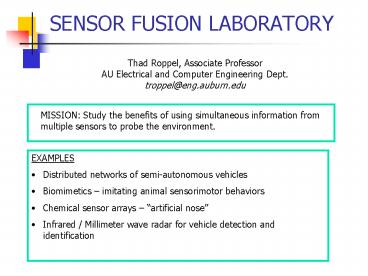SENSOR FUSION LABORATORY - PowerPoint PPT Presentation
Title:
SENSOR FUSION LABORATORY
Description:
... (PhD): Biomimetic Simulations of Organized Machine Behavior Arun Raghunathan (MS): Autonomous rovers Adam Ray (MS): ... – PowerPoint PPT presentation
Number of Views:40
Avg rating:3.0/5.0
Title: SENSOR FUSION LABORATORY
1
SENSOR FUSION LABORATORY
Thad Roppel, Associate Professor AU Electrical
and Computer Engineering Dept. troppel_at_eng.auburn.
edu
- EXAMPLES
- Distributed networks of semi-autonomous vehicles
- Biomimetics imitating animal sensorimotor
behaviors - Chemical sensor arrays artificial nose
- Infrared / Millimeter wave radar for vehicle
detection and identification
2
SENSOR FUSION LABORATORY
3
Personnel and Publications
- Current Students
- Rama Narendran (PhD) Biomimetic Simulations of
Organized Machine Behavior - Arun Raghunathan (MS) Autonomous rovers
- Adam Ray (MS) Development system for
cooperative robotics research - Four undergraduates working in the area of
cooperative machines
- REPRESENTATIVE RECENT PUBLICATIONS
- D. M. Wilson, T. Roppel, and R. Kalim,
"Aggregation of Sensory Input for Robust
Performance in Chemical Sensing Microsystems,"
Sensors and Actuators B, 64(13), 107-117, June
2000. - T. Roppel and D. M. Wilson, "Biologically-Inspired
Pattern Recognition for Odor Detection," Pattern
Recognition Letters, 21(3), 213219, March 2000. - D. M. Wilson, K. Dunman, T. Roppel, and R. Kalim,
"Rank Extraction in Tin-Oxide Sensor Arrays,"
Sensors and Actuators B, 62(3), 199-210, April
2000. - T. Roppel, R. Kalim, and D. Wilson, "Sensory
Plane Analog-VLSI for Interfacing Sensor Arrays
to Neural Networks, " Virtual Intelligence and
Dynamic Neural Networks VI-DYNN '98, Stockholm,
Sweden, June 22-26, 1998.
4
Summary of Selected Projects
Robotic Networks Build cooperative human /
robotic networks with distributed, redundant C3I
capability. Use optic flow to replace GPS for
navigation.
IR / MMW DATA FUSION (AFOSR) Improved
identification of military vehicles from aerial
scenes using neural networks applied to
co-boresighted IR and MMW radar sensors.
Chemical Sensor Arrays (DARPA) Improved
identification and detection of chemical plumes
in non-laboratory conditions.
Biomimetics Learn sensor fusion from animals.
Apply this to flying a drone to target using
onboard video































